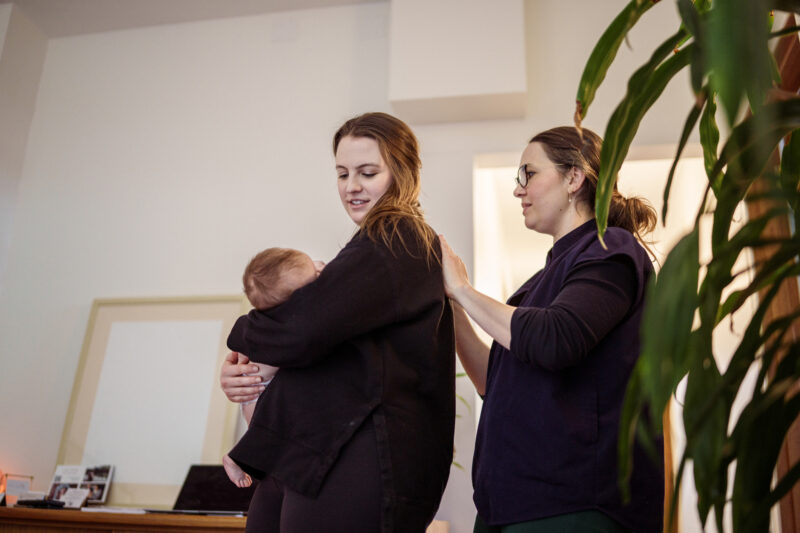
What Is the Role of a Postpartum Doula? Everything You Need to Know
4 min.
A postpartum doula provides essential support for families after childbirth, helping with recovery, newborn care, and emotional well-being.
Welcoming a new baby is one of life’s most beautiful transitions—but it can also be one of the most overwhelming. Between sleepless nights, physical recovery, and learning to care for a newborn, many families find themselves needing more support than they anticipated. That’s where a postpartum doula comes in—offering calm, compassionate guidance during those early days and weeks at home.

You deserve compassionate postpartum care.
Our program for new parents includes support from a certified postpartum doula.
What is a doula?
A doula is a trained professional who provides non-medical physical, emotional, and informational support to individuals and families during pregnancy, childbirth, and the postpartum period. While birth doulas assist during labor and delivery, postpartum doulas focus on the adjustment period after birth—helping families transition smoothly into their new routines.
Unlike nurses or midwives, doulas do not provide medical care. Instead, they complement healthcare providers by offering hands-on assistance and emotional reassurance when parents need it most.
What is doula training?
To become a doula, you complete specialized training programs that cover topics such as childbirth education, lactation support, postpartum recovery, and family dynamics. Reputable certifying organizations include DONA International, CAPPA, and ICEA, each offering rigorous coursework and practical experience.
Training helps doulas develop skills in communication, newborn care, and emotional support—ensuring they can respond to the unique needs of every family. Some doulas specialize exclusively in postpartum care, while others are cross-trained to offer both birth and postpartum support.
Defining the postpartum period
The postpartum period begins immediately after childbirth and typically lasts six weeks, though emotional and physical recovery can extend for months. During this time, the body heals from pregnancy and delivery while hormones fluctuate, affecting both mood and energy levels.
It’s a stage of immense adjustment—physically, emotionally, and socially. For many parents, having knowledgeable, nonjudgmental support makes all the difference in easing this transition.
What do postpartum doulas do?
A postpartum doula provides personalized support based on each family’s needs. Some families hire a doula for daytime support, while others prefer overnight care to help manage sleep schedules. Their services often include:
- Newborn care education — Teaching feeding, soothing, and diapering techniques.
- Emotional support — Offering a listening ear and reassurance during the adjustment period.
- Light household help — Managing simple chores or meal prep to lighten the load.
- Sleep guidance — Helping families establish healthy rest routines.
- Partner support — Ensuring both parents feel confident and included.
The goal of a postpartum doula is to nurture the entire family—helping parents feel rested, informed, and supported as they settle into life with their newborn.
How much does a postpartum doula cost?
The cost of hiring a postpartum doula depends on several factors, including experience, location, and length of service. On average, families can expect to pay anywhere from $30 to $60 per hour, or choose package rates that range from a few hundred to several thousand dollars.
While insurance rarely covers doula services, some families may use flexible spending accounts (FSAs) or health savings accounts (HSAs). Considering the personalized care and peace of mind a doula provides, many parents find the investment well worth it.
Many doulas offer flexible arrangements, from hourly rates to weekly packages. Some even provide virtual support, offering guidance via video chat or phone calls. A growing number of doulas also specialize in lactation consulting, postpartum planning, and mental health support.
Benefits of a doula
Research and lived experience alike highlight the many benefits of having a postpartum doula, including:
- Reduced postpartum depression and anxiety
- Improved breastfeeding success rates
- Faster physical recovery
- Greater confidence in parenting skills
- Better partner communication and bonding
Beyond practical help, doulas offer emotional steadiness—a calm presence that encourages self-care, connection, and balance during one of life’s biggest changes.
Why hire a doula?
Hiring a postpartum doula provides professional, nonjudgmental care that goes beyond what friends or family can offer. For new parents—especially those without local support—a doula becomes a steady, reassuring guide through sleepless nights and emotional ups and downs.
Their role isn’t to take over but to empower parents, helping them build confidence in caring for themselves and their baby.
Questions to ask a postpartum doula
Before hiring a doula, it’s important to find someone whose approach aligns with your family’s needs. Consider asking:
- What training or certification do you have?
- What services are included in your packages?
- How do you provide emotional support?
- Do you offer overnight or weekend care?
- How do you handle challenges like feeding issues or postpartum mood concerns?
Having an open conversation ensures trust, comfort, and compatibility—key ingredients for a supportive relationship.
How to find a postpartum doula?
Every family’s postpartum experience is unique. Whether you’re looking for practical help, emotional guidance, or simply reassurance that you’re not alone, a postpartum doula can provide invaluable care.
You can find certified doulas through organizations like DONA International, Postpartum Support International, or local community networks that connect parents with trained professionals. Also, some programs for new parents, like those offered by Charlie Health, offer support from postpartum doulas.
How Charlie Health can help
If you know a new parent struggling with their mental health who could use more than once-weekly support, Charlie Health is here to help. Charlie Health’s virtual Intensive Outpatient Program (IOP) provides behavioral health treatment for people dealing with serious mental health conditions, including perinatal mental health conditions like postpartum depression. Our expert clinicians incorporate evidence-based therapies into individual counseling, family therapy, and group sessions. With this kind of holistic online treatment, managing your mental health is possible. Fill out the form below or give us a call to start healing today.

